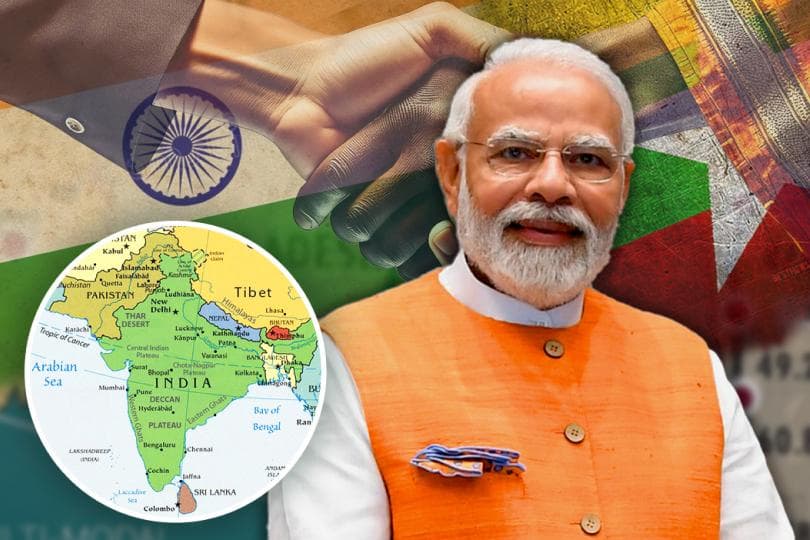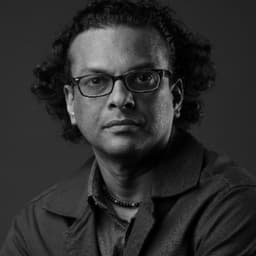Modi 3.0 - India and Sri Lanka
How Prime Minister Narendra Modi could steer India and Sri Lanka toward a future of stability, trust and prosperity through his unwavering leadership and vision.

Narendra Modi's third successive term as India's premier heralds a new era of policy consistency and economic stability for the world's largest democracy. This continuity in leadership is expected to enhance investor confidence, fostering an environment where economic policies can mature and yield significant results. However, the implications of Modi's third term extend beyond India's borders, profoundly influencing its relationship with Sri Lanka, a nation with which it shares deep historical ties and complex geopolitical dynamics.
Under Modi's leadership, India has embarked on ambitious initiatives such as 'Make in India,' aiming to transform the nation into a global manufacturing hub. The emphasis on digital infrastructure, renewable energy, and rural development underscores a balanced approach to economic growth. With Modi 3.0, this trajectory promises to continue, offering a stable and resilient economic landscape.
India's political stability and economic resurgence inevitably reverberate across its borders, particularly influencing Sri Lanka. Historical conflicts and mistrust have marked the relationship between these two nations, yet recent years have seen notable improvements. Modi 3.0 must navigate this delicate balance, understanding the aspirations, sovereignty, and territorial integrity of Sri Lanka.
One of the most significant sources of mistrust between India and Sri Lanka dates back to the early 1980s, during Sri Lanka’s civil war. India’s intervention, primarily through the Indian Peace Keeping Force (IPKF), was intended to stabilize the region but ended up fostering resentment among Sri Lankans who viewed it as an occupation. This period is a stark reminder of how interventions, even with the best intentions, can lead to long-lasting mistrust when miscommunications dominate the narrative. The Jayewardene-Gandhi 1987 Indo-Lanka peace accord led to the Janatha Vimukthi Peramuna (JVP) rebellion, which ended with the country losing 60,000 people, primarily youth, including one of my own.
Despite this rich foundation of shared culture and history, decades of mistrust have often strained the relationship between India and Sri Lanka. The scars from past interventions, economic disagreements, and geopolitical tensions have created barriers that are not easily overcome. As Narendra Modi embarks on his third term, there is a unique opportunity to heal these wounds and mitigate Sri Lanka's concerns. Modi 3.0 can focus on transparent and empathetic diplomacy, ensuring that Sri Lanka's sovereignty and aspirations are respected. Building on the goodwill from India's support during Sri Lanka's 2022 economic crisis, India can continue to engage in meaningful dialogue, invest in mutually beneficial projects with transparency, and promote people-to-people connections. By addressing historical grievances and fostering a spirit of genuine partnership, Modi's administration can help transform the narrative from mistrust to trust and collaboration.
Political and economic interactions do not just define the relationship between India and Sri Lanka but are deeply woven into their shared civilization and cultural heritage. For centuries, the two nations have exchanged ideas, traditions, and customs, creating rich connections that transcend borders. The influence of Indian culture in Sri Lanka is evident in various facets of life, from the spread of Buddhism to the shared love for music and cinema. The culinary traditions of both countries reflect a blend of flavours and techniques, with spices and dishes that tell stories of ancient trade and migration. In the realm of arts, Bollywood and Sri Lankan cinema have enjoyed mutual admiration and collaboration, while music and dance forms often echo similar rhythms and expressions. Cricket, the beloved sport, stands as a powerful symbol of camaraderie, with fervent fans on both sides of the Palk Strait celebrating the game with unmatched passion. These cultural connections, rooted in centuries of shared history, foster a sense of kinship and mutual respect, enriching the bilateral relationship profoundly.
Economic interactions have also been fraught with misunderstandings. For example, the leasing of the Hambantota Port to China, following failed negotiations on Colombo port with India, fueled perceptions that Indian economic proposals were politically motivated to counter the Chinese. Trade agreements like the proposed ETCA since 2016 faced opposition in Sri Lanka, with critics arguing it would disproportionately benefit India. These economic disputes underscore the need for transparent and equitable negotiations that address both nations' concerns.
Diplomatic relations have not been immune to miscommunications. Political statements and actions often get misinterpreted, leading to strained relations. India's emphasis on Tamil rights in Sri Lanka, while rooted in genuine concern, has been perceived as meddling in internal affairs, exacerbating mistrust. Effective communication channels and diplomatic protocols must be maintained to prevent such issues from escalating.
Sri Lanka's strategic location in the Indian Ocean makes it a focal point for global superpowers like China, the USA, Russia, and Japan. Each nation seeks to establish influence, complicating Sri Lanka's foreign policy and national security strategies. For instance, China's substantial investments through the Belt and Road Initiative have raised concerns about debt dependency and strategic leverage. The USA views Sri Lanka as a crucial partner in its Indo-Pacific strategy aimed at countering Chinese influence, and Japan also maintains significant interests, adding layers of complexity.
Sri Lanka finds itself at the heart of a complex geopolitical power play, with major global powers like China, India, Russia, the USA, and Japan vying for influence over its foreign policy, investments, digital economy, and infrastructure projects. Since 1977, Sri Lankan leaders have faced the daunting challenge of balancing these competing interests while safeguarding national sovereignty and promoting economic development. The strategic location of Sri Lanka in the Indian Ocean makes it a coveted ally, but this also subjects it to intense international scrutiny and pressure. Amidst this intricate balancing act, India, as a close neighbour with deep historical and cultural ties, should approach Sri Lanka's situation with heightened empathy. Recognizing the immense pressure Sri Lankan leaders face, India can play a pivotal role in offering support that respects Sri Lanka's autonomy and helps navigate the treacherous waters of global politics, ensuring that its neighbour can pursue independent and sustainable development.
For Sri Lanka, balancing these diverse interests is a formidable challenge. The upcoming presidential elections, due before October 17, 2024, will see around 17 million Sri Lankans deciding their next leader. This leadership will steer the nation through these geopolitical waters, ensuring Sri Lanka's sovereignty and interests are safeguarded while leveraging international relationships for national development. Modi 3.0 must approach this scenario with a nuanced understanding of Sri Lanka's position, addressing misunderstandings and building trust.
India's role during Sri Lanka's 2022 economic crisis is a testament to this understanding and solidarity. As Sri Lanka grappled with severe shortages of essential goods, skyrocketing inflation, and a debilitating foreign exchange deficit, India extended a helping hand. India provided a $1 billion line of credit to help Sri Lanka procure essential commodities alongside an earlier $500 million line of credit for fuel imports. These measures were crucial in stabilizing supply chains and ensuring necessities remained accessible.
Beyond financial aid, India also dispatched humanitarian assistance, including medicines and food supplies, showcasing a holistic approach to crisis management. This gesture was not merely transactional but rooted in a deep sense of regional kinship and responsibility. Sri Lankan leaders publicly acknowledged India's support, emphasizing its role in addressing critical shortages and preventing further deterioration.
For India to build a genuine partnership with Sri Lanka, it must connect with the aspirations, fears, and beliefs of the 22 million Sri Lankan people. This requires active listening, respectful engagement, and a commitment to mutual benefit. By addressing these dimensions with empathy and respect, India can help alleviate fears and build trust.
Narendra Modi's third term heralds a period of promise for India, with the potential to extend this promise to its neighbours. For Sri Lanka, this period could signify a new dawn in bilateral relations, marked by mutual respect and understanding. As both nations navigate the complexities of their past and the challenges of the present, the vision of a harmonious and prosperous future remains within reach.
India's aspirations are different from Sri Lanka's. India's challenges are different from Sri Lanka's. India's opportunities are different from Sri Lanka's. Sri Lanka only needs to take care of 22 million people. For Sri Lanka, Sri Lanka comes first. For India, India comes first. Mutual understanding and mutual respect are the only way forward for a bilateral relationship.



































